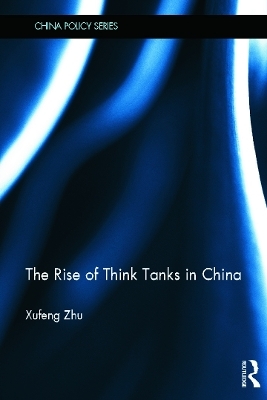
The Rise of Think Tanks in China
Seiten
2012
Routledge (Verlag)
978-0-415-66900-9 (ISBN)
Routledge (Verlag)
978-0-415-66900-9 (ISBN)
Despite continuing criticism of the Chinese authoritarian political system, the range of participants in the decision-making process has widened, with different social actors now playing an increasingly important role in the Chinese policymaking process. Accordingly, the role of think tanks in the policymaking process has generated great interest within and outside China. This book explores the behaviour and influence of China’s think tanks, and explains the reasons and social consequences of the rise of think tanks in China.
The book raises several questions on the topic: How did think tanks emerge in China? What are the essential factors that determine think tanks in terms of building their governmental and personal networks? How do think tanks work and build their influence in the Chinese policy process? What happens to Chinese society when think tanks become important policy participants in the policy process? The book goes on to discuss new perspectives on policy processes and elite politics in China, and empirically, with comparative case study and data from nationwide questionnaire surveys, provides a comprehensive picture of think tanks in the current political system of the country.
The book raises several questions on the topic: How did think tanks emerge in China? What are the essential factors that determine think tanks in terms of building their governmental and personal networks? How do think tanks work and build their influence in the Chinese policy process? What happens to Chinese society when think tanks become important policy participants in the policy process? The book goes on to discuss new perspectives on policy processes and elite politics in China, and empirically, with comparative case study and data from nationwide questionnaire surveys, provides a comprehensive picture of think tanks in the current political system of the country.
Xufeng Zhu is Professor in the Zhou Enlai School of Government at Nankai University, China.
Part 1: Theoretical and Analytical Framework 1. Introduction 2. Think Tanks and China's Think Tanks 3. Influences of China’s Think Tanks Part 2: Different Origins and Behavioral Patterns: Seven Cases 4. Government-Affiliated Semi-Official Think Tanks 5. Non-Governmental Operational Think Tanks with Government Sponsorship 6. Non-Governmental Think Tanks Part 3: Networks, Influences, and Social Consequences: A Nationwide Survey 7. Observations of Think Tank Influence and Networks 8. The Origin of Think Tank Networks 9. Influences and Strategies 10. Social Consequences: Does Think Tanks’ Influence Matter? Part 4: Conclusion 11. Policy Market in China
| Erscheint lt. Verlag | 18.9.2012 |
|---|---|
| Reihe/Serie | China Policy Series |
| Zusatzinfo | 29 Tables, black and white; 19 Line drawings, black and white; 19 Illustrations, black and white |
| Verlagsort | London |
| Sprache | englisch |
| Maße | 156 x 234 mm |
| Gewicht | 570 g |
| Themenwelt | Sozialwissenschaften ► Politik / Verwaltung ► Staat / Verwaltung |
| Sozialwissenschaften ► Soziologie ► Spezielle Soziologien | |
| ISBN-10 | 0-415-66900-6 / 0415669006 |
| ISBN-13 | 978-0-415-66900-9 / 9780415669009 |
| Zustand | Neuware |
| Haben Sie eine Frage zum Produkt? |
Mehr entdecken
aus dem Bereich
aus dem Bereich
Organisationen steuern, Strukturen schaffen, Prozesse gestalten
Buch | Softcover (2024)
Rehm Verlag
38,00 €
Buch | Softcover (2024)
Springer Fachmedien Wiesbaden GmbH (Verlag)
29,99 €


